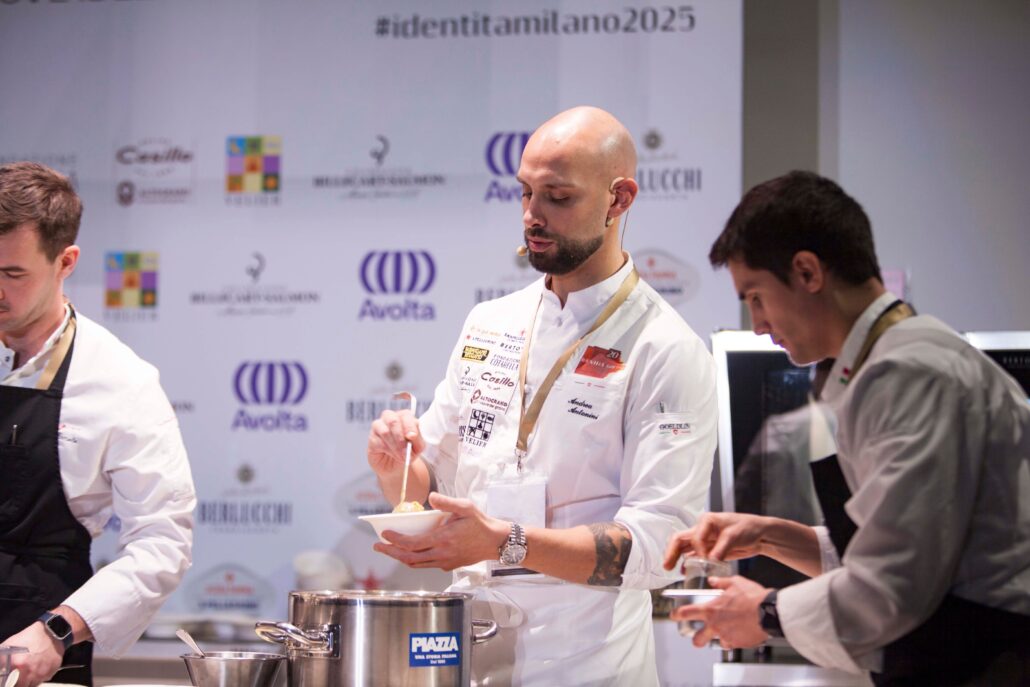Italy is the country with the oldest population in Europe. According to data from the CNEL report “Demography and the Workforce,” Italy has entered a phase of demographic decline since 2014, which is threatening to weaken the country’s workforce. This is a fact that is seeping into all aspects of Italian life, including its beloved food culture and restaurant industry. Therefore, now more than ever, the onus is on the young gastronomes and chefs who have stayed or even returned from training abroad to shape the present and future of Italian gastronomy. During the last February weekend in 2025, Cook_inc. met some of these young voices in gastronomy at Identità Golose, Italy’s most important food congress created to give Italian chefs a space for discourse. There, we collaborated with Identità young, a project that focuses on chefs under 35, by interviewing these emerging chefs to understand who they are, what they do and their views on the Italian gastronomic scene. And, just as importantly, to inquire about their hobbies and zodiacs.
“If you cook in a castle, expectations are different than if you cook in a pub” says Alessandro Billi, who decided to cook in a restaurant outside Tortona station, after training and cooking in kitchens all over the world.
Location, setting and context in gastronomy shape the expectations and experiences of diners, thus Billi emphasises the need to reassess and transcend what these factors can and should be. His conviction seemed to ring true as we listened to all the young chefs’ stories and journeys, as one sentiment stood out: the will to return home and invest in the place you come from. Although going abroad and training in foreign kitchens remains an essential part of a young chef’s education, instead of abandoning their roots, the trend goes towards bringing that new knowledge back. They are choosing to invest their time, passion, and resources in their place of origin, enriching their local culinary scenes with global influences. Although many of these new restaurants emphasize their location as part of their identity, they don’t opt to adapt to their setting but rather carry with them the breath of fresh air and spark they caught training away from home, merging together who they were and who they have become. An example of this return to the roots are Anisia Cafiero and Pasquale De Biase, who after training in Scandinavia returned to Molise, where they fuse Nordic techniques with local vegetarian ingredients at their restaurant Ausa di Isernia.
“Free time? What is free time?” replied almost all chefs half jokingly when asked what they like to do outside of work.
While said in jest, these semi-ironic answers are based on an awareness of the pressing issue of social sustainability that is so common in their industry. Nevertheless, the chefs appear to understand the importance of maintaining a healthy work life balance, as most of them make an effort to have a life outside of the kitchen. Taking care of yourself in such a high stress environment is already difficult when doing it for your own sake, but the pressure intensifies even more when your restaurant’s success is at stake too. Life as a chef really appears to be one great balancing act. Keeping social, economic and ecological sustainability in equilibrium seems to be the premise for the new restaurant to thrive. For this to happen it is necessary to overhaul much of the standard practices and conventions that have been ruling the kitchen for decades, like harsh hierarchies and brigade, traditional cuisine and menu design, and conventional use of ingredients and resources. After all, every restaurant is also a business where the chef has to become an entrepreneur too if it is to survive.
“Nowadays many people becoming chefs only care about the fame without being willing to do the actual work” declares Andrea Antonini, executive chef at Imàgo in Rome, alluding to the trend of chefs becoming celebrities.
Many of the interviewees thematize how the persona of the chef as a public figure seems to have been growing stronger and along with it the pressure to perform outside of the kitchen too. Social media is fueling this progression to its peak while creating another issue, everything you do and put out is recorded and reviewed so there is nothing short of perfection that is accepted. How do you navigate these expectations, and what is the role of the chef in 2025? As much as these issues were discussed, no clear solution emerged – which perhaps is the whole point. The takeaway from this year’s Identità Golose seems to be that fostering discourse is the first step toward sparking change in the industry (aside from the fun fact that most chefs are Libras or Cancers). The present is the future as what we do now is what our world becomes and, after this weekend, it seems like we are in good hands.


